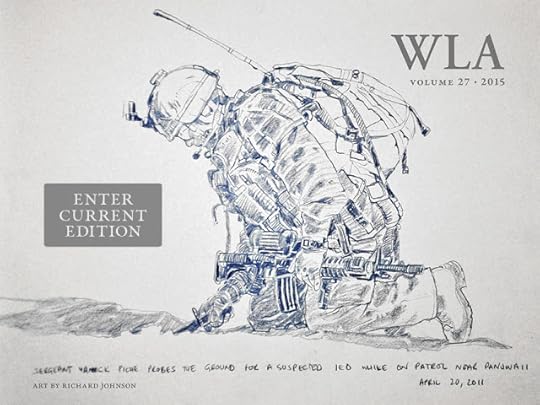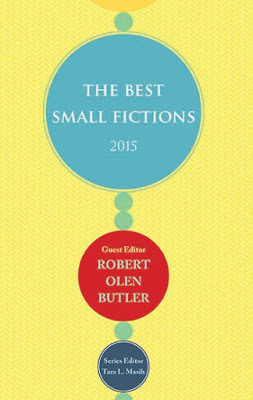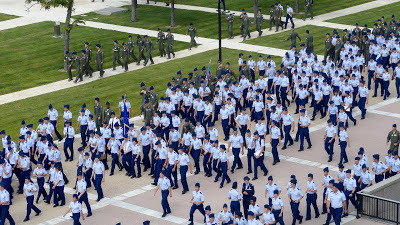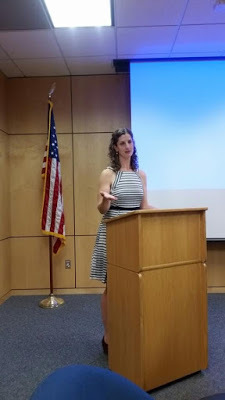Katey Schultz's Blog, page 5
November 3, 2015
1 Hour of Internet Per Workday Is Still 6 Weeks of Your Life
 As a part of my renewed focus on creative flow and insistence on a balanced life as a self-employed artist, I made a major change to my daily schedule three weeks ago. Ready? I only engage in online activities for 60 minutes per day, usually in one sitting right before noon. On occasion, I'll split my time into two, 30-minute chunks (morning and end of work day). And although it's only been three weeks, I've experienced enough of a trend on Mondays to make one exception: Mondays I spend 90 minutes online. That's the only way to deal with the backlog from the weekend, because of course, on the weekend--I don't check email at all. (More on that in this Friday's post.)
As a part of my renewed focus on creative flow and insistence on a balanced life as a self-employed artist, I made a major change to my daily schedule three weeks ago. Ready? I only engage in online activities for 60 minutes per day, usually in one sitting right before noon. On occasion, I'll split my time into two, 30-minute chunks (morning and end of work day). And although it's only been three weeks, I've experienced enough of a trend on Mondays to make one exception: Mondays I spend 90 minutes online. That's the only way to deal with the backlog from the weekend, because of course, on the weekend--I don't check email at all. (More on that in this Friday's post.)Now, let me explain. This is different than unplugging completely, but the experience I had doing that in August (follow the link) taught me just how discursive and distracting access to wi-fi makes me feel. Likewise, assessing my business needs and time management, I found that even 1 hour of Internet per work day is 20 hours per month, or 240 hours per year, which is equivalent to six, 40-hour work weeks per calendar year. No one is paying me to check my email or be online. Would I work for free for someone for 6 weeks? Not checking email, I wouldn't. And yet...even drastically limiting Internet time still only brings this annual tally down to 6 weeks. If that's not worth thinking twice about, I don't know what is.
Second, let me clarify: I'm being realistic and gentle with myself. Everyone knows the dieter who says "I'm not going to eat any sweets for 30 days!" is typically munching on Tootsie Rolls a week later. Or the meditator who says, "I'm going to meditate for 365 consecutive days" who then keeps it up for a month, but fails on day 31 and loses all inspiration because the "perfect" goal is no longer attainable. I didn't want that to happen to me when I set about to rearrange my relationship to the Internet.
So I laid a few ground rules: First, turn wi-fi off on my computer when it's not the designated Internet time. Second, treat my Internet time like an appointment--keep it, use it efficiently, and don't run overtime. Third, if an exception is needed, make a game-time decision and be particularly vigilant. So here's where being "gentle" comes in, and yes, a person can be gentle and vigilant at the same time. Also, be realistic--because when it comes right down to it, most things don't warrant an exception. Most things, including people, can wait.
Let's say I've already had my 60 minutes of Internet time for the day (and yes, that includes email, social media, and any surfing [of which I do very little]), but I finish a few critiques for my private students and it's still before 5 or 6pm. Should I log in and send them their critiques? I make a game-time decision. If the critiques are due the next day or thereabouts, I draft the emails in Word while offline. Then I enable the wi-fi on my computer, log in, and literally hold my palm over most of the screen so that I can't see my inbox. I cut and paste the messages into a new message box, attach the critique, and click send. All done? Sign off, quit, and turn off the wi-fi on my computer again.
But what about that brilliant thought you have a 4pm or that question you have to ask to get the job done, or that person who you know is checking their messages on their phone and expecting your reply, pronto? For the brilliant thought: Write in Word (I keep a file open at all times called "Emails to Send"), save it, and deal with it tomorrow. For the burning question: Same. Damn. Thing. YES, it can wait. Unless you're on deadline, there is very likely something else you can do with your time that will be equally (likely more) productive that does not require Internet. For the person awaiting your reply: Anticipate a message from them when you log in the next day, asking if you got the message they sent 12 hours ago and if not, they've forwarded it to you again for your convenience. Then, when your Internet time begins the next day, reply to the requests and tasks at hand, and call it done. A few more exchanges like that, and people will learn that you don't reply right away. And guess what? They'll respect it.
"Ok, ok, but what about your blog?" you might ask. Well, I compose it entirely offline, then cut and paste during my 60 minutes of Internet, and schedule the post to go live whenever I want it to--and I have auto-links set up that will post to Twitter and Facebook when the post publishes, without me even doing a thing. So what am I doing at 8am on Tuesdays and Fridays when The Writing Life gets published, linked on social media, and shared online? I'm writing a short story. I'm listening to the rain fall. I'm sketching. I'm staring into the morning light and thinking about levees and upbringing the next move my character Paul is going to make when he drives to his 10-year high school reunion. I'm dreaming, in other words, but the kind of dreaming one does when they are very wonderfully, delightfully, creatively, awake.








Published on November 03, 2015 05:00
October 30, 2015
What's SPOOKY About Being a Self-Employed Writer
I travel about once a month to teach, lecture, or read from my book. During these trips, I often get to talk to the folks who make these events possible. These are people who believe in sharing literature and making writing a viable career for authors, as well as an accessible art form for their participants. Making these connections always brightens my day. Usually, I work alone. Being alongside movers and shakers with their "fingers on the pulse" of artistic offerings and engagement with the public is exciting for me. I always learn something new, and usually come away inspired.
Inevitably, these conversations also turn to the fact that I'm self-employed. When I was on the book tour, the easy mistake a lot of folks made was to "idealize" or "romanticize" the life of a newly published writer. I encountered this line of thinking so frequently, in fact, that I wrote a series of blog posts discussing the nitty-gritty of my book tour (preamble, part 1, part 2, part 3), in addition to this tell-all interview published on The Billfold. Now that my business and my work as an author is slightly more established (If you're reading this, you're a part of that--thank you!), I often meet folks who ask, in so many words, Isn't it scary being a self-employed writer?
First of all: I'm lucky. My parents had multiple careers and I got to see how they jumped tracks, went back to school or training, took financial and professional leaps, and eventually reaped the rewards for dreaming big. Those rewards? Satisfying work and a quality of live that was good enough, and most of the time--quite comfortable. Second, my dad left his work for the State of Oregon when I was in high school and I watched him start his own business, heard the way he talked about rates or clients or renting an office or negotiating new contracts, and some part of me must have been listening. If he could do it, I could do it.
Indeed, there were times during my three years on the road when being a self-employed anything during the Great Recession felt scary. But never in a way that would lead to ruin. Never in a way that made me question my decision. And certainly never in a way that made me have doubts. If anything else, negotiating uncertainty further fueled my belief that I could, and in fact would, make this writing life work. The best part, and the only thing that always remains no matter what the economy is doing, no matter who is President, no matter what state I'm in, no matter who's "hot" in publishing, no matter what anyone thinks is that, at the end of the day, I love what I do. I write stories. I write essays. I try to live a full and conscientious life. I try to make sense of the world around me, even when the world I see is hurting or doesn't seem to add up. I mentor other writers and cherish the friendships that develop through this process. And I meet other people who love stories, too.
Scary? Maybe. But mostly...? Absolutely fulfilling.









Published on October 30, 2015 05:00
October 27, 2015
Patriotism in a Post-9/11 World
 http://www.wlajournal.com
http://www.wlajournal.comI'm delighted to have a new essay, "On Patriotism & the Language of GWOT," published this month in War, Literature & the Arts. This is the only government-funded literary journal in the country, in print and online, and is published by the United States Air Force Academy. The essay explores my relationship to the word PATRIOTISM from 9/11 to the present, against a backdrop of changing careers, meeting veterans, and concern for today's youth.
Some highlights:
"I remember walking the flag-lined streets of that tiny town in the Berkshire Mountains. I remember the empty grocery store shelves—duct tape, diapers, double A’s, and Quaker oats on backorder. I remember sitting on the roof of the old orchard house to gaze at a night sky uncut by domestic flights for the first time in my life. I remember watching VHS-recorded news coverage of those two towers nearly a week after the fact (we didn’t have television; I didn’t own a car). And because I was volunteering for my country as an AmeriCorps trail crewmember, I also remember feeling an acute and immediate sense that Americans come to understand patriotism in very different ways. I was twenty-two years old and my country was going to war...
By 2005, when my students started asking about peak oil, however, I sensed genuine fear. This, they could imagine. They had seen their own soil invaded once before. They had heard the language of GWOT on repeat via media outlets during their formative years. Unlike myself, the question of whether or not their country could keep them safe had been a bona fide consideration for these students almost half their memorable lives. What kind of nation would they be handed over in a few years—short on oil, wonky on climate, and half the world pissed off at them? I was twenty-five years old and my country was waging two wars. I left teaching and I left those teens...
While September 11, 2001 left me speechless and teaching left me tired, it turned out that in fact I did have something to say. Furthermore, what I wanted to say was about war, consequences, and the people on all sides. I finished graduate school in June 2008 during the Great Recession. Seven months later, I was laid off from my job at a local coffee shop, losing 10 complimentary meals per week, health insurance, and wages. Student loans bills loomed. I was thirty years old and unemployed. My country was still at war. Had I failed my country, or had my country failed me?...
Several months after I was in New York, I received an email from Dan McCready, former Marine and Harvard Business School graduate. He introduced himself as the founder of a start-up company based in Charlotte, North Carolina that was committed to pioneering the American spirit. My attention caught. If ever there were a buzz phrase coming out of the language of GWOT, it was exactly that: American spirit..."
The essay in full is published here, completely free. Note that many "head honchos" of war lit are also featured in this issue. I'm humbled to be in their company and can whole-heartedly recommend this publication, and this issue in particular, as an incredible resource of deep thinking and creative effort in the field of war lit and military writing.








Published on October 27, 2015 05:00
October 23, 2015
The Overwhelms
I had an incredible weekend at Interlochen College of Creative Arts teaching my Deep Revision course. My gears are still turning, meantime, here are some stunning shots from peak fall in Northern Michigan. It was a gift to be there among such bright, open minds and deep thinkers.



Despite the invigoration of being at Interlochen and teaching, I somehow came down with a major case of “the overwhelms.” The good news? I can say with confidence that I love everything I do for my Writer at Large business as well as my creative work as a writer (and of course, this includes the areas where those two aspects overlap). The tough news? As meticulously as I plan my schedule and work hard at being my own boss, there’s no way to “get back” those hours I lose to travel. This means that the “one trip per month” rule I’ve instituted is helpful insofar as it keeps me from overkill, but not helpful in that I still haven’t figured out “where the extra hours” are going to come from when I hit the road (or the friendly skies, as the case may be). With a public event and travel booked once a month now through August of 2016 (excluding December), that leaves me a bit concerned.
The solution? Time to take it down a notch this week and sketch more, read more, drink more tea, and be kinder to myself even as the “to do’s” stack up. I won’t find a solution in a harried state and, while I’m not completely harried yet, the threat is real. Without a bit of reflection and a clearer path forward, I won’t be doing my best work.
I have the pleasure of working with many different writers on projects across the United States (and one shout-out to Canada!). I won’t settle for anything less than my best work because the cost is simply too high. With other writers’ creative efforts and heartfelt projects on the line, the only solution is to look within and take care of myself, then come up for air with a different dynamic so I can keep doing my best.
I’m always glad to catch myself before things go “too far,” but it’s likewise a good reality check and reminder that I will be my own boss for the rest of my life. I’ve got get better at it—though I’m in no way disappointed in what I’ve learned and done so far. Being my own boss and the only employee at the same time means keeping the eye on the big picture while also getting the day-to-day done with levity and joy. Most days, I can do that.
Here’s to levity and joy—more of both, please, as we twirl downward into this lovely season of fall and early winter.










Despite the invigoration of being at Interlochen and teaching, I somehow came down with a major case of “the overwhelms.” The good news? I can say with confidence that I love everything I do for my Writer at Large business as well as my creative work as a writer (and of course, this includes the areas where those two aspects overlap). The tough news? As meticulously as I plan my schedule and work hard at being my own boss, there’s no way to “get back” those hours I lose to travel. This means that the “one trip per month” rule I’ve instituted is helpful insofar as it keeps me from overkill, but not helpful in that I still haven’t figured out “where the extra hours” are going to come from when I hit the road (or the friendly skies, as the case may be). With a public event and travel booked once a month now through August of 2016 (excluding December), that leaves me a bit concerned.
The solution? Time to take it down a notch this week and sketch more, read more, drink more tea, and be kinder to myself even as the “to do’s” stack up. I won’t find a solution in a harried state and, while I’m not completely harried yet, the threat is real. Without a bit of reflection and a clearer path forward, I won’t be doing my best work.
I have the pleasure of working with many different writers on projects across the United States (and one shout-out to Canada!). I won’t settle for anything less than my best work because the cost is simply too high. With other writers’ creative efforts and heartfelt projects on the line, the only solution is to look within and take care of myself, then come up for air with a different dynamic so I can keep doing my best.
I’m always glad to catch myself before things go “too far,” but it’s likewise a good reality check and reminder that I will be my own boss for the rest of my life. I’ve got get better at it—though I’m in no way disappointed in what I’ve learned and done so far. Being my own boss and the only employee at the same time means keeping the eye on the big picture while also getting the day-to-day done with levity and joy. Most days, I can do that.
Here’s to levity and joy—more of both, please, as we twirl downward into this lovely season of fall and early winter.








Published on October 23, 2015 05:00
October 20, 2015
#tinymoment #flashfiction Video Prompts
More video prompts from my time out and about in the Midwest as I traveled through Chicago O'Hare to teach at Interlochen this week. Miss last week's prompts? Click here.
















Published on October 20, 2015 05:00
October 16, 2015
Online Resource in Deep Revision
This weekend I travel to Interlochen Center for the Arts in northern Michigan to teach a 10-hour weekend-long course in Deep Revision for fiction and nonfiction. This is a new course for me and I'm excited and nervous in the best possible ways--when I get this feeling in my chest before teaching, I know I'm onto something. I'll be delivering roughly 7 lesson (paired with activities and debriefs) on the topic of Deep Revision (more info here), including subjects such as: creative flow, sentence-level revision, tension, and reverse outlining, and scene interrogation.
I know not everyone can travel for writing workshops due to family, finances, timing, and other obstacles. I want to take a moment to direct readers of The Writing Life toward my own "drafted" thoughts on this topic as expressed in my Revising the Novel series of posts. By going to the lower left sidebar of this site and entering the search term "Revising the Novel" into the box, you'll be redirected to a listing of more than 30 posts on this subject matter.
I use The Writing Life as my public sketchpad to work through ideas and share the highs, lows, and middles of a writer's life. That means free content as I go along, but if you find these writings beneficial and feel inspired to "pay it forward," I'll gladly accept your rating and/or review of Flashes of War on Amazon or Goodreads. This will really help!
Meantime, I'm en-route to Interlochen courtesy United Airlines, with the new album by my fave contemporary folk rock musician, Josh Ritter, ringing in my ears. Here's a sample of his Sermon on the Rocks via NPR.







I know not everyone can travel for writing workshops due to family, finances, timing, and other obstacles. I want to take a moment to direct readers of The Writing Life toward my own "drafted" thoughts on this topic as expressed in my Revising the Novel series of posts. By going to the lower left sidebar of this site and entering the search term "Revising the Novel" into the box, you'll be redirected to a listing of more than 30 posts on this subject matter.
I use The Writing Life as my public sketchpad to work through ideas and share the highs, lows, and middles of a writer's life. That means free content as I go along, but if you find these writings beneficial and feel inspired to "pay it forward," I'll gladly accept your rating and/or review of Flashes of War on Amazon or Goodreads. This will really help!
Meantime, I'm en-route to Interlochen courtesy United Airlines, with the new album by my fave contemporary folk rock musician, Josh Ritter, ringing in my ears. Here's a sample of his Sermon on the Rocks via NPR.








Published on October 16, 2015 06:08
October 13, 2015
Creative Flow
As a way of jump-starting creative flow each morning, especially during times the novel feels as stiff as a corpse, I've been experimenting with short exercises in creative flow. There are a lot of scholars who talk about creative flow, or some similar word, and plenty of scientists who study it as well. In my former life as a Montessori middle school teacher, this concept was a guiding principle in the environment I created and the way I carried myself as a teacher. (For persuasive research on creative flow, check out Mihaly Csikszentmihalyi's
Finding Flow: The Psychology of Engagement with Everyday Life
).
Lately, trying not to take on too much but also trying to balance my daily need for the sense of "anything's possible" that creative flow induces, I've made short video clips to inspire the beginnings of flash fictions (free for the taking!), I've started making one sketch a day in my very informal notebook with my very unpracticed hand, and I've begun to collect quotes and clips that inspire me. Here's a clip of Picasso at work. Talk about intuitive:
And here are two quotes I like to ponder:
"The advice I like to give young artists, or really anybody who'll listen to me, is not to wait around for inspiration. Inspiration is for amateurs; the rest of us just show up and get to work. If you wait around for the clouds to part and a bolt of lightning to strike you in the brain, you are not going to make an awful lot of work. All the best ideas come out of the process; they come out of the work itself. Things occur to you." (Chuck Close)
While I agree, I also think there's something to be said for keeping ourselves available to inspiration, or even for "faking it" until we make it. When I'm working in my Sketch a Day journal that's exactly what I'm doing--faking it--because after just a few minutes, my mind feels more open and ready to approach the novel tasks at hand. That's not passive, but it's not nose-to-the-grindstone "work," either. I guess I'd call it consciously working with my own imagination; not unlike stretching before or after a long run.
"The creative process is a cocktail of instinct, skill, culture, and a highly creative feverishness. It is not like a drug; it is a particular state when everything happens very quickly, a mixture of consciosness and unconsciousness, of fear and pleasure; it's a little like making love, the physical act of love." (Francis Bacon)
The only thing that doesn't fully resonate with me here is what Bacon describes as happening "very quickly." I think that describing the creative process or art-making process as something fast can feed dangerously into the stereotype of the artist working in a flurry of insight (much like the lightning bolt Chuck Close cautions against). In fact, most creativity can't be "seen" or "measured" in terms of time and accomplishment. It's a slow unfolding; a time lapse of a flower opening. Why would someone want to measure that and risk taking the flow out of it? Just let the flower unfold. Better yet, be the flower.








Lately, trying not to take on too much but also trying to balance my daily need for the sense of "anything's possible" that creative flow induces, I've made short video clips to inspire the beginnings of flash fictions (free for the taking!), I've started making one sketch a day in my very informal notebook with my very unpracticed hand, and I've begun to collect quotes and clips that inspire me. Here's a clip of Picasso at work. Talk about intuitive:
And here are two quotes I like to ponder:
"The advice I like to give young artists, or really anybody who'll listen to me, is not to wait around for inspiration. Inspiration is for amateurs; the rest of us just show up and get to work. If you wait around for the clouds to part and a bolt of lightning to strike you in the brain, you are not going to make an awful lot of work. All the best ideas come out of the process; they come out of the work itself. Things occur to you." (Chuck Close)
While I agree, I also think there's something to be said for keeping ourselves available to inspiration, or even for "faking it" until we make it. When I'm working in my Sketch a Day journal that's exactly what I'm doing--faking it--because after just a few minutes, my mind feels more open and ready to approach the novel tasks at hand. That's not passive, but it's not nose-to-the-grindstone "work," either. I guess I'd call it consciously working with my own imagination; not unlike stretching before or after a long run.
"The creative process is a cocktail of instinct, skill, culture, and a highly creative feverishness. It is not like a drug; it is a particular state when everything happens very quickly, a mixture of consciosness and unconsciousness, of fear and pleasure; it's a little like making love, the physical act of love." (Francis Bacon)
The only thing that doesn't fully resonate with me here is what Bacon describes as happening "very quickly." I think that describing the creative process or art-making process as something fast can feed dangerously into the stereotype of the artist working in a flurry of insight (much like the lightning bolt Chuck Close cautions against). In fact, most creativity can't be "seen" or "measured" in terms of time and accomplishment. It's a slow unfolding; a time lapse of a flower opening. Why would someone want to measure that and risk taking the flow out of it? Just let the flower unfold. Better yet, be the flower.









Published on October 13, 2015 05:00
October 9, 2015
#tinymoment #flashfiction Video Prompts
It's fall and that means my Weekly Flashes program for October is rockin' and rollin'. With 17 participants from across the country, I have my work cut out for me each weekend as their story submissions come in via email and I send out the next round of prompts. Meantime, thinking about so many small moments and trying to incorporate other mediums and visuals into my daily life, I started a series of video flash prompts on Vine.
The way Vine works, these videos have to be short--perhaps a limit of 10 seconds--and the number of characters permitted per post is almost impossibly small. But I'm giving it a go, creating one video clip a day, followed by a suggestion or, in most cases, the first line of what could be your next flash fiction story. It's an invitation, a glimpse into how I blend what I'm seeing with what I'm imagining, all in the same moment. I hope you find these snippets fun and maybe one of them will even take hold and turn into a story for you!








The way Vine works, these videos have to be short--perhaps a limit of 10 seconds--and the number of characters permitted per post is almost impossibly small. But I'm giving it a go, creating one video clip a day, followed by a suggestion or, in most cases, the first line of what could be your next flash fiction story. It's an invitation, a glimpse into how I blend what I'm seeing with what I'm imagining, all in the same moment. I hope you find these snippets fun and maybe one of them will even take hold and turn into a story for you!








Published on October 09, 2015 05:00
October 6, 2015
THE BEST SMALL FICTIONS 2015
 I've been waiting for today since April, when I first learned that my work was being considered for the Queen's Ferry Press Best Small Fictions anthology. Today, the 2015 collection launches and if ever there were a time to buy it, that time is now. A few clicks and this book's ratings will go up, word will spread, and you'll have in your hands one of the very best collections of short fiction around. Buy indy through bookstores like this one, or buy online through Amazon--whatever suits your fancy or your wallet--and then sit back and enjoy what I know is going to be a historically notable collection of top-notch work.
I've been waiting for today since April, when I first learned that my work was being considered for the Queen's Ferry Press Best Small Fictions anthology. Today, the 2015 collection launches and if ever there were a time to buy it, that time is now. A few clicks and this book's ratings will go up, word will spread, and you'll have in your hands one of the very best collections of short fiction around. Buy indy through bookstores like this one, or buy online through Amazon--whatever suits your fancy or your wallet--and then sit back and enjoy what I know is going to be a historically notable collection of top-notch work.My flash fiction story "The Last Thing They Might Have Seen," published last year in KYSO Flash, was nominated for consideration in this anthology and made it all the way to the list of 105 finalists. Even here, to have a story listed alongside the likes of legendary Stuart Dybek, for instance, felt quite exciting. From this list, 2015 judge Robert Olen Butler read blindly and chose 55 stories to be published in THE BEST SMALL FICTIONS 2015, and while my story was not selected, my name does appear as a finalist on the back of the book.
But what excited me even more about this collection is the fact that it serves as a great entry point for those writers new to flash fiction, as well as a trustworthy source for diverse voices for those writers practiced in the form. If you're looking for top-notch, current flash fiction, this anthology is the book to order. Teaching a class? Become familiar with the form, get introduced to great writers, and enjoy the broad spectrum of stories as you explore which pieces you might want to use in your classroom.
Want more info? Here's the official press release, and follow publisher Queens Ferry Press on Twitter or like the BSF FB page for updates on readings near year. Have you had a story published in the last year that you think is worthy of nomination? Have you read one published elsewhere that knocked your socks off? Notify the editors of those publications and encourage them to make their nominations for next year's collection now.








Published on October 06, 2015 05:19
October 2, 2015
Flashes of War at the US Air Force Academy (part 2)

Continuing the conversation from earlier this week, I want to share some of my encounters with the cadets during my visit to the United States Air Force Academy. This blog is somewhat like a public sketchpad for my writing life. When I'm really trying to understand a new idea, I may go on a little long. Next week, we'll be back to regularly scheduled programming. Promise.
This trip has been full of "firsts" for me, not the least of which was my first time critiquing a teaching writer's work in front of his own students. My gracious main point of contact at the Academy shared three of his flash fiction drafts and asked me to select one for critique. He then shared the marked-up draft with his students and when we gathered for class, his story was the topic at hand. I have no doubt the cadets respected their professor's vulnerability in this regard, as did I.
When we reached an opportunity to talk about Flashes of War, the cadets in this non-majors class wanted to know about "the most common mistakes" early flash fiction writers make. (I told them new flashers take on a topic or timeframe that's too big, or that they fail to realize what's "at stake" for their characters and to show that on the page by way of reaction.). They wanted to know how I conducted the research that lead to Flashes of War. They wanted to know "how long it takes" me to write 3 pages. (Thirty-six years, a.k.a. the number of years I've been on the planet!) And they wanted to know which of my own stories was my "favorite." To this last point, I told them (half-heartedly) that they should all just buy my book and then give it away as a gift when they were done reading it. (Note: Having your stories included in a college course doesn't mean everyone buys your book; it means a lot of people are making photocopies..."Fair Use" constitutes 10% of a book, and many of my stories are online, so there are plenty of freebies out there, though most writers I know wouldn't mind 40 more book sales that could have happened. In my world, the honest-to-goodness honor of being included as required reading in a college course makes up for it, for me...for now.)
This notion of a "favorite" story intrigued me, and rather than tell them what single story of my own to read, I sent them to Steve Almond's "Geek Player, Love Slayer" from My Life in Heavy Metal, which was one of the first short stories I read that really affirmed my belief that anyone could write about anything. If Steve Almond could teach me something about being a woman in my thirties because he wrote so damn convincingly, then surely I could write about war. Our "favorite" stories, then, are those that teach us something unforgettable--and in the case of many writers, those that give us permission to push our own boundaries on the page.
The other two classes I met with were for upperclassmen and mostly (all?) English majors. The first class began with the faculty member saying, "None of you better ask Ms. Schultz what authority she has to write about war," followed by a very succinct explanation of why, before he opened the floor to questions. This was completely unprompted by me and I admired the professor's directness. He wanted to hit the ground running with meaningful conversation. By getting "authorization" summarized at the outset, we were able to do just that.

Immediately, these cadets were ready to go deep into the work. They wanted to know how I choose one word over another in a sentence (this meant I got to talk about verbs, which is basically my favorite thing to talk about other than Gus the Superdog). Another wanted to know about my background in philosophy and how that informs my love for language (this meant I got to talk about the web of words, Socrates, wonder, and the imagination). Another said that she normally "freaks out" when non-veterans write about the war experience, but that she didn't have that response to my work. "They were different; these stories. There was something different about. What was that?" she asked. This opened the door to a conversation about the role of intent in the imagination. If the intent is to indoctrinate, appropriate, or destroy, then that's going to show up in the work--and all of the cadets, I said, surely know when someone is trying to feed them a line of crap or persuade them of something for ulterior motives. I didn't approach Flashes of War with the feeling that I might actually know "what's right" and "what's wrong." I'm glad this young woman was able to see and feel that. There's nothing (other then a contract for my next book!), that I think I want more as a writer, in fact.
Finally, I found an entry point into the topic of growing concern in my own mind: Is the imagination valued at the United States Air Force Academy? I've spent a lot of time thinking about research and the imagination, but it was only this week that I felt prompted to ponder discipline and the imagination. The warm-up to this topic, I'm certain, occurred during my phone conversation with Academy alumnus, veteran, teacher, writer, and go-getter Jay Moad, who I spoke to before my flight. Jay helped me realize that in order to get through to the cadets, I'd need to speak to issues on their trajectory, namely, the fact that they are being trained as future leaders. (There are less kind words besides "leader" for a cadet...such as "premeditated murderer" or "reluctant killer"--two labels I heard off and on during my visit, which startled me.) Jay rightly explained to me that if a cadet wants to be a good leader, he/she needs to be able to relate to and understand those men and women serving around them. How do we relate to people, especially those from different walks of life? By using our imaginations, of course, and I'd add to that, by using empathy.
Furthering that thought, why not meet these people different than ourselves by studying them first in fiction? Why not explore the greats and the contemporaries, then ponder how they did what they did and got it right, and what can be gained from these endeavors? We may not be able to "teach imagination" like we can teach chemistry, but we can nurture its possibility by creating the causes and conditions from which the imagination is born. Tomorrow's leaders should study the "how" of literature not just because "it's something to major in," but because it is, in fact, a life-saving skill.
I also told the cadets that if they could understand the men and women they were trying to lead, those people would "work that much harder for them" (Jay's words). Then I told them about my experience on the 6th floor of the library, in a place where apparently no one goes, which also happens to be the only place on campus where I saw obsession and the imagination at their best. "I've only been here a few days," I said, "and I have the feeling you all have discipline down pat." They nodded. A few smiled.
"If you can do formation," one woman said, "then that means you know how to pay attention to details. Details matter."
I told her I couldn't agree more. "But discipline by itself only makes you get really good at doing what's already been done," I said. "Or doing the same thing over and over again. Discipline alone is limiting, and discipline without the imagination is, in fact, a failure."
The cadets didn't balk. They were right there with me, and I'm certain that the open environment this professor has created in his classroom was a big part of that. When I asked them whether or not their training encouraged them to imagine, whether they were learning how to nurture and regard the imagination, and whether they felt that the imagination was valued as a tactical military skill, I was met with a universal shaking of heads. No. No, no, and NO.
"We're taught to 'know our people,'" one young woman said. "But we're taught that that means knowing their names, where they're from, if they have siblings, what their hobbies are, etc. But I guess...." here she paused. "...I guess that's not really 'knowing' someone."
Quite suddenly, we were out of time and class ended. I felt a sense of immediacy; I wanted to grab the bright minds in that room and form a cadet committee devoted to curriculum overhaul, in short--to the possibility of actually teaching someone that real changes begin with unadulterated inquiry and wonder. From there, we apply the imagination and our intelligence to make change happen. Add discipline into the mix and, quite truly, you have the power to change the world for the better. But if we don't know how to smell a rat (a.k.a. an agenda), then we'll never really be able to get to a place of true openness and understanding. And if we found an institution with the agenda that we have a universal right to defend our lives and "our soil" to the death (and sometimes, pre-emptively), can we even gain access to unadulterated inquiry? Can we imagine outside of ourselves just as effectively as we can fly a fighter jet? Can we ever, really, actually, "win"?
I think of Kunduz, Afghanistan, in particular. I think of ISIS. I think if Iraq, Iraq, Iraq. We've built our wall of military might and ambition so high, all we can do is beat our heads against it over and over. How can we possibly see over that wall? How can we venture around it? By imagining, of course, and although I'm writing metaphorically, I hope my intent is clear: We'll die and die again, taking thousands along with us, if today's military leaders and the cadet-leaders of the future don't start thinking like fiction writers, too.
This line of thought is not without flaws, I realize. My view is not all-encompassing. One might, for example, argue that the display I saw of every military-issued [gun? rifle?] since the civil war is, in fact, humankind's imagination at its very best. A meeting of technology and endeavor. Perhaps...but I keep going back to intent...I keep going back to agenda...and while I do believe there can be a "just war," I'm not sure I've seen one executed that way, start to finish.
Fast forward a few hours and a few more classes, and I'm on the 6th floor of Fairchild academic building, looking over the terrazzo. [Rank X] is with me, my host for lunch. He's spent 12 hour shifts in bunkers for months on end, working missile defense drills and waiting at the ready, in the event of a land or air attack over U.S. soil. His smile today, outside the confines of that bunker, is wide and welcoming. Later, I'll meet equally wide smiling officers--some who have moved American cash across deserts and borders, one who transported a captive with a bag over his head, another who agonizes over an upcoming PT test and waistline measurement, another buying diamonds for his wife, another working on an essay for academic publication, and still another who can't say a damn thing about what he did or where. But here, now, with [Rank X], the cadets are lining up for formation on the terrazzo just before lunch. (See the ones jogging in this video? Those are the freshman. They can only jog [never walk] on the outside line of the pavement, they can only carry their backpacks in their left hands [never wear them], can only use certain staircases [not the convenient ones], and cannot speak outdoors unless spoken to, among other notable orders that will change as they progress through their education at the academy).
And here's the view mere moments later, before the cadets march into Mitchell dining facility, a large kitchen which feeds 4,000 growing bodies in under 20 minutes.

I wanted to stop time, overlooking this "garden of gods" filled with "reluctant killers" or "future leaders." I wanted to pull the tape from the reel and watch it fall onto the floor. I wanted to stomp my feet, to shout, to pound the glass with my fists. More than anything, I wanted the sun to stay warm and steady in the sky for a little longer while all those cadets fell out of formation, lounged in the grass, and settled in with a few good books and the permission to imagine beyond. Beyond. And beyond again. Can't you see it? Their blue caps in the grass, their shiny shoes reflecting that crystal Colorado sunlight, the pages turning, turning, and all the smiles of youth lit across their faces like so many lives being saved.








Published on October 02, 2015 05:00



